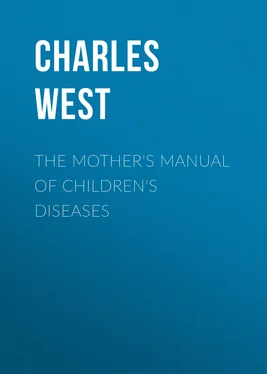Charles West - The Mother's Manual of Children's Diseases
Здесь есть возможность читать онлайн «Charles West - The Mother's Manual of Children's Diseases» — ознакомительный отрывок электронной книги совершенно бесплатно, а после прочтения отрывка купить полную версию. В некоторых случаях можно слушать аудио, скачать через торрент в формате fb2 и присутствует краткое содержание. Издательство: Иностранный паблик, Жанр: Руководства, Медицина, foreign_desc, на английском языке. Описание произведения, (предисловие) а так же отзывы посетителей доступны на портале библиотеки ЛибКат.
- Название:The Mother's Manual of Children's Diseases
- Автор:
- Издательство:Иностранный паблик
- Жанр:
- Год:неизвестен
- ISBN:нет данных
- Рейтинг книги:5 / 5. Голосов: 1
-
Избранное:Добавить в избранное
- Отзывы:
-
Ваша оценка:
- 100
- 1
- 2
- 3
- 4
- 5
The Mother's Manual of Children's Diseases: краткое содержание, описание и аннотация
Предлагаем к чтению аннотацию, описание, краткое содержание или предисловие (зависит от того, что написал сам автор книги «The Mother's Manual of Children's Diseases»). Если вы не нашли необходимую информацию о книге — напишите в комментариях, мы постараемся отыскать её.
The Mother's Manual of Children's Diseases — читать онлайн ознакомительный отрывок
Ниже представлен текст книги, разбитый по страницам. Система сохранения места последней прочитанной страницы, позволяет с удобством читать онлайн бесплатно книгу «The Mother's Manual of Children's Diseases», без необходимости каждый раз заново искать на чём Вы остановились. Поставьте закладку, и сможете в любой момент перейти на страницу, на которой закончили чтение.
Интервал:
Закладка:
But it is not every bottle which an infant should be fed from, and least of all from those so much in vogue now with the long elastic tube, so handy because they keep the baby quiet, who will lie by the hour together with the end in its mouth, sucking, or making as though it sucked, even when the bottle is empty. These bottles, as well as the tubes connected with them, are most difficult to keep clean; and so serious is this evil, that many French physicians not only denounce their use, in which they are perfectly justified, but prefer, to the use of any bottle at all, the feeding the infant with a spoon; and here I think they are mistaken. The old-fashioned flat bottle, with an opening in the middle, and a short end to which the nipple is attached without any tube, the only one known in the time of our grandmothers, continues still the best, and very good. My friend, Mr. Edmund Owen, in a lecture at which I presided at the Health Exhibition in August last year, pointed out very humorously the differences between the old bottle and the new. An infant to be kept in health must not be always sucking, but must be fed at regular intervals. The careful nurse takes the infant on her knee, feeds it from the old-fashioned feeding-bottle, regulating the flow of the milk according as the infant sucks heartily or slowly, withdraws it for a minute or two, and raises the child into a sitting posture if it seems troubled with flatulence, and then after a pause lets it recommence its meal. This occupies her a quarter of an hour or twenty minutes of well-spent time, while the lazy nurse, or the mother who has never given the matter a thought, just puts the tube in the infant's mouth, and either takes no further trouble or occupies herself with something else. And yet, obvious though this is, how constantly one sees infants taken about in the perambulator with the feeding-bottle wrapped up and laid by its side, because it is said the child always cries when it is not sucking, and the intelligence and the common sense are wanting, as well as the patient love, that would strive to make out which it is of many possible causes that makes the infant cry. One more observation with reference to bottle-feeding may not be out of place. It is this: that no food be left in the bottle after the child has had its meal, but that it should be emptied, washed out with a little warm water and soda, and it and the india-rubber end should be kept in water till again needed. To insure the most perfect cleanliness it is always well to have two bottles in use, and to employ them alternately.
How strictly soever an infant may be kept at the breast, or however exactly the precautions on which I have insisted are observed, sickness, constipation, or diarrhœa may occur, causing much anxiety to the parents, and giving much trouble to the doctor.
It sometimes happens, without its being possible to assign for it any sufficient reason, that the mother's milk disagrees with her infant, or entirely fails to nourish it, so that, much against her will, she is compelled to give up suckling it. In some instances this is due to errors in diet, to the neglect of those rules the observance of which is essential to health, as proper exercise for instance; and then the secretion is usually deficient in quantity as well as defective in its composition. In such cases the child often vomits soon after sucking, it suffers from stomach-ache, its motions are very sour, of the consistence of putty, and either green, or become so soon after being passed, instead of presenting the bright yellow colour and semi-fluid consistence of the evacuations of the healthy infant, and sometimes they are also lumpy from the presence of masses of undigested curd. In addition, also, the child is troubled with griping, which makes it cry; its breath is sour, or actually offensive, and the tongue is much whiter than it should be, though it must be remembered that the tongue of the sucking child always has a very slight coating of whitish mucus, and is neither as red nor as perfectly free from all coating as it becomes in the perfectly healthy child of three or four years old.
In these circumstances, the diminution of stimulants, such as the stout of which young women are sometimes mistakenly urged to take a quantity to which they were previously quite unaccustomed, is often followed by an increase of the quantity as well as an improvement in the quality of the milk. It is true that a nursing mother may often find her strength maintained, and her supply of milk increased, by taking a glass of stout at lunch and another at dinner, instead of, but not in addition to, any other stimulant; but mere stimulants will no more enable a woman to suckle her infant better than she otherwise would do, than they would fit a man to undergo great fatigue for days together, or to go through a walking tour in Switzerland. A tumbler of one-third milk and two-thirds good grit gruel taken three times a day will have greater influence in increasing the quantity of milk than any conceivable amount of stimulant.
There is an entirely opposite condition in which the infant does not thrive at the breast, and this for the most part is met with when the mother has already given birth to and suckled several children. In these instances the secretion is sometimes, though not always, abundant, but the infant does not thrive upon it. The babe does not get on, is always hungry after leaving the breast, and cries as though it wanted more; in addition to which it is often purged, either while sucking or within a few minutes afterwards, though the motions, except in being more frequent and more watery than in health, do not by any means constantly show any other change. The mother's history explains the rest. She is constantly languid, suffers from back-ache, feels exhausted each time after the babe has sucked, probably has neuralgia in her face, or abiding headache. In many instances, too, her monthly periods return, though as a rule they do not appear in healthy women while suckling. All these symptoms show that her system is not equal to the duty she has undertaken, and that therefore, for her sake as well as for that of the infant, she must give up the attempt.
One more case there is in which suckling has to be given up, at any rate in part, and that is when the milk is good in kind, but insufficient in quantity for the child as it grows older. This insufficiency of quantity shows itself at different periods after the infant's birth—at two months, three, or four. The child is not otherwise ill than that it is no longer bright, as it was wont to be, it ceases to gain flesh, it sleeps more than it used to do, though when it wakes it is always eager for the breast, and cries when leaving it, and if the experiment is made of giving it some milk and water immediately on leaving it, it takes that greedily. Mothers are loth to believe this failure of their resources, and in the case of some who have firm and well-formed breasts, there is but little change in their appearance to show that what remains may serve for beauty, not for use. But if while the child is sucking, the nipple is taken suddenly from its mouth, instead of innumerable little jets of milk, spirting out from the openings of the milk-ducts, the nipple will be seen to be barely moistened by its languid flow.
In conditions such as these the question of weaning partially or completely inevitably occurs, and where the mother's weakness is the occasion of the failure to nourish the child, half-measures are of no avail, for so long as she does not entirely give up the attempt to do that to which her health is unequal, her own state will grow worse, that of the child will not improve. When errors of diet or inattention to general rules of health incapacitate the mother from the performance of her duty, there may be hope from the adoption of a wiser course; while when the supply simply fails from its inadequacy, much may be hoped for from a wise combination of hand-feeding with nursing at the breast; the mother perhaps suckling the infant by day, but being undisturbed by demands upon her at night.
Читать дальшеИнтервал:
Закладка:
Похожие книги на «The Mother's Manual of Children's Diseases»
Представляем Вашему вниманию похожие книги на «The Mother's Manual of Children's Diseases» списком для выбора. Мы отобрали схожую по названию и смыслу литературу в надежде предоставить читателям больше вариантов отыскать новые, интересные, ещё непрочитанные произведения.
Обсуждение, отзывы о книге «The Mother's Manual of Children's Diseases» и просто собственные мнения читателей. Оставьте ваши комментарии, напишите, что Вы думаете о произведении, его смысле или главных героях. Укажите что конкретно понравилось, а что нет, и почему Вы так считаете.











